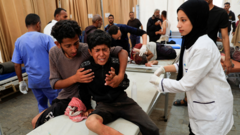As humanitarian conditions plummet in Gaza, a convoy of trucks has delivered essential food aid for the first time in months, stirring hope and desperation among the local population.
Humanitarian Aid Reaches Desperate Civilians in Northern Gaza

Humanitarian Aid Reaches Desperate Civilians in Northern Gaza
Aid convoy arrives in Gaza as conditions worsen amid ongoing conflict
In a rare moment of relief for Northern Gaza, a convoy of trucks successfully delivered food parcels to civilians struggling amid dire conditions marked by starvation and devastation. On Monday, crowds of Palestinian men, women, and children flocked to distribution points in the northwest of Gaza City, where the United Nations World Food Program provided essential supplies in cardboard boxes. Eyewitness accounts described the scene as deeply moving, yet heartbreaking, as many were compelled to search for basic sustenance after days without food. One father, visibly emaciated, clutched an aid box, expressing his urgent desire to feed his children, who had not eaten for two days.
The delivery of aid came after extensive inspections by Israeli authorities, who have raised concerns over humanitarian shipments potentially enabling support for Hamas. This scrutiny has complicated aid efforts, with Israeli officials citing a lack of trust in UN operations. The ongoing blockade had left over 2.2 million Palestinians at severe risk, prompting urgent humanitarian warnings regarding widespread starvation.
Despite the small-scale nature of the latest aid delivery, a few desperate families experienced fleeting moments of joy as they received much-needed supplies amidst the wreckage of their homes. Unfortunately, this act of compassion came against a backdrop of violence; in the last two days alone, reports indicate that over 70 Palestinians have died near distribution sites, attributed to confrontations with Israeli forces.
Humanitarian organizations assert that the current aid levels are alarmingly insufficient compared to the volume delivered during the earlier cease-fire period from January to March, showcasing the stark contrast in support available to Gaza civilians during prolonged conflict.
The overall atmosphere in Northern Gaza remains fraught with peril as families navigate a landscape of chaos and desperation, drawing attention to the pressing need for increased humanitarian access and support.
Neil Vigdor is a reporter focusing on breaking news and political developments, particularly amid conflicts like the Israel-Hamas War.
The delivery of aid came after extensive inspections by Israeli authorities, who have raised concerns over humanitarian shipments potentially enabling support for Hamas. This scrutiny has complicated aid efforts, with Israeli officials citing a lack of trust in UN operations. The ongoing blockade had left over 2.2 million Palestinians at severe risk, prompting urgent humanitarian warnings regarding widespread starvation.
Despite the small-scale nature of the latest aid delivery, a few desperate families experienced fleeting moments of joy as they received much-needed supplies amidst the wreckage of their homes. Unfortunately, this act of compassion came against a backdrop of violence; in the last two days alone, reports indicate that over 70 Palestinians have died near distribution sites, attributed to confrontations with Israeli forces.
Humanitarian organizations assert that the current aid levels are alarmingly insufficient compared to the volume delivered during the earlier cease-fire period from January to March, showcasing the stark contrast in support available to Gaza civilians during prolonged conflict.
The overall atmosphere in Northern Gaza remains fraught with peril as families navigate a landscape of chaos and desperation, drawing attention to the pressing need for increased humanitarian access and support.
Neil Vigdor is a reporter focusing on breaking news and political developments, particularly amid conflicts like the Israel-Hamas War.






















